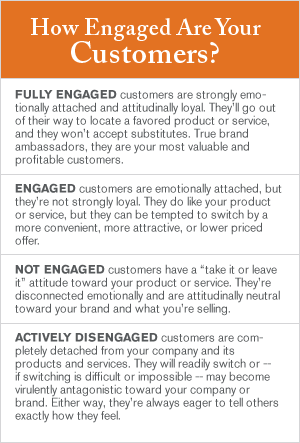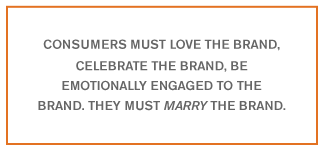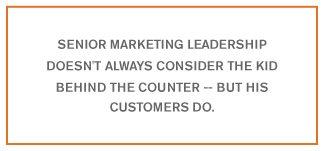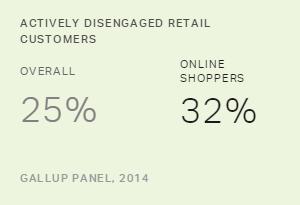What is your brand's promise? Not your brand's slogan, logo, package, or image -- those aren't promises, those are marketing tools. A brand promise is everything a brand is, everything it does, everything it stands for, and every way it affects the life of the consumer.
 |
If you're not sure what your brand's promise is, you're in good company. Gallup research has found that only 40% of employees feel that they really understand their company's brand promise. What's more, in many businesses, the closer the employee is to the customer, the less able he or she is to articulate the company's brand promise.
Consumers, however, may well know your company's brand's promise -- even when your employees don't. That's because many companies invest time and money letting consumers know what they're promising but fail to tell their own employees just what that promise means for them.
Customers remember what the company has promised, and they're highly attuned to whether that promise is kept. If companies fail to deliver, consumers will skip to a competitor without a second thought. Healthy brands must continuously attract the right prospects and retain good customers -- and they can only do that when they keep their promises -- and do so at each and every brand encounter.
A brand is only as good as the promises it keeps. But how do companies keep the brand promise? A quality product in an attractive package at a competitive price with abundant distribution and a memorable ad campaign should be enough. At least, that's what many brand managers believe -- and then wonder why sales stagnate and erode.
But, great brand managers care about the total brand experience; their goal is to create and nurture a deep personal connection between the consumer and the brand. Great brand managers recognize that if the brand promise is to be kept, it must be shared -- and not just with the customer, but with everyone in the organization who has a role in keeping that promise at every point of meaningful customer contact.
 |
"We want to be more than a sign in the stadium, a logo on a shirt. We want to go deeper and show we're part of the life of the customer," said Claire Edgar, brand leader for the Champion Athletic Apparel division of HanesBrands, Inc., at a recent Gallup conference on igniting brand passion. Edgar told attendees at the Chicago event that Champion profiles high-potential prospects, facilitates the translation of active intention into behavior, and carefully choreographs the consumer's experience. It's no small task, she allowed, but that's how promises are communicated and kept.
Attracting new customers in today's highly competitive marketplace requires more than just making big promises. And enticing consumers into a single brand experience won't ensure that an enduring relationship will result. To turn prospects into customers, a brand promise must be both credible and compelling, and consumers must be able to readily see themselves as patrons, buyers, and owners. They must personally and emotionally connect with the company's brand promise.
But that's only enough to initiate a brand relationship. To sustain it, a company must create and deliver a coherent and consistently rewarding brand experience. To turn customers into obsessives -- people who ignore your competitors and will do without if they can't get your brand -- your brand must mean more to them than any other.
Consumers must love the brand, celebrate the brand, and be emotionally engaged to the brand. They must marry the brand. And if a company wants engaged customers, it must start with engaged employees -- employees who feel just as connected to the brand they represent and whose promises they are called upon to keep. (See sidebar "How Engaged Are Your Customers?") Furthermore, according to Gallup's research, workers who are emotionally connected to their jobs are more productive, more profitable, stay longer with the company, and are safer. And, they take pride in creating customer connections.
Fully engaged customers are the sweet spot for any business. They visit more often, spend more on each visit, resist competitive overtures, promote your brand to others, and are much more forgiving when the inevitable performance hiccups occur. These customers represent a 23% premium over average customers in terms of wallet share, profitability, and relationship growth, according to Gallup research. Business units that are in the top 25% based on their levels of customer engagement outperform the rest on measures of profit, sales, and growth by a factor of two to one.
 |
When a business unit is in the top 25% on both the customer and employee engagement measures -- in other words, when employees and customers are highly engaged -- Gallup would say that this unit is "optimized." Units that are optimized not only have high engagement scores, they also return significant business benefits to the organization. (See "Optimize" in the "See Also" area on this page.)
But optimized units are fairly rare. Unfortunately, the vast majority of employees and consumers aren't that engaged. According to the most recent Gallup Management Journal survey, on average, only 26% of employees are engaged with the places where they work. In contrast, 55% of employees are not engaged, and 15% of employees are actively disengaged from their workplace. (See "Would You Fire Your Boss?" in the "See Also" area on this page.)
Similarly, according to the 2005 Gallup customer engagement database, only 17% of customers are fully engaged, or emotionally connected to, the brands in the database; 24% are engaged; 34% are not engaged; and 25% are actively disengaged, with no meaningful bonds to these brands.
Brand ambassadors
Brand ambassadors are the employees who carry your brand's promise and message into the world. This can be both good and bad -- a company's disgruntled workers are also ambassadors, although the message they send to consumers might be exactly the opposite of what the company would like them to convey.
It should be noted, however, that not all employees are natural ambassadors. Businesses cannot assume that engaged employees automatically embrace the company's brand promise, especially if they don't know what it is.
In early 2007, the Gallup Panel surveyed 3,151 working adults to determine their level of engagement at work and their level of brand ambassadorship. (See "Don't Neglect Your Brand Ambassadors" in the "See Also" area of this page.) Gallup analyzed the data by job/type, level of workplace engagement, and industry type. The results were alarming:
- Less than one in three (29%) of the workers surveyed achieved high scores on Gallup's scale of brand ambassadorship, demonstrating that they understood their company's brand promise and took great pride in the products and services their company markets to consumers.
- 31% of those surveyed who directly interact with customers scored high on the brand ambassador scale.
- The more engaged workers are with their workplace, the more likely they are to achieve a high score on the brand ambassador scale -- yet only 26% of the U.S. workforce is engaged.
- Executives are more likely to achieve high scores on the brand ambassador scale than are non-executive employees, but in many cases, they're also the least likely to interact directly with customers.
- Brand ambassadorship is often highest among employees working for companies in categories such as beverage and consumer packaged goods, where brand promises are kept more by products than by people. When employees are the cornerstone for keeping the company's promise -- in categories like banking, hospitality, and retail -- the levels of brand ambassadorship are markedly lower.
As the Panel results reveal, the employees most likely to be a company's brand ambassadors are those at the executive levels. But how often does a company executive serve a pizza, take a customer on a test drive, or carry bags to a hotel room? In other words, how often do customers interact with the brand's most informed and passionate ambassadors? Rarely, if ever.
 |
Thus, getting the best brand ambassadors in front of the customer means one of two things -- either executives need to abandon their jobs, grab an apron, and get on the floor, or the workers already on the front lines need to become better ambassadors. For most companies, making this happen won't be easy.
"Most companies rarely even consider how to make employees into brand ambassadors," said Ed O'Boyle, a Gallup brand consultant. "Most expect employees will necessarily be good ambassadors but ignore the function of engagement in brand ambassadorship." Far too many companies fail to recognize that employees need to be taught and supported to become and remain brand ambassadors.
Ambassador training
At the event, O'Boyle emphasized that employees don't become brand ambassadors by accident. To grow a cadre of brand ambassadors, a company needs four things:
- a systematic way to share the brand message with all employees
- a method to make employees feel involved in the brand experience
- the leverage to enable employees to fulfill the brand promise
- a way to reinforce the brand ambassador behaviors they want to see in the organization
Most brand managers, however, don't have access to any of these things. Marketing teams haven't been organized to recognize the value of internal brand ambassadors, so they lack the companywide leverage to encourage, sustain, and reward brand ambassadors. Nonetheless, it shouldn't be that hard of a sell. "Companies that understand the value of employees must value engagement. Companies that value their brand must also value their ambassadors," said O'Boyle.
Even if brand managers have all four tools at their disposal, it won't make any difference if the rank-and-file employees don't understand the brand promise -- and Gallup research indicates that most employees don't. The same Panel research showed that only about 40% of U.S. employees could strongly agree that "I know what my company stands for and what makes our brand different from the competition." Thus, the first audience for any company's brand promise must be internal. To be effective, those brand ambassadors must do more than know what the promise is; they must know how to deliver on that promise.
Say a hotel's brand promise is "A good night's rest or your money back," but it takes three hours to deliver the extra pillow the customer requested. When the customer complains, the desk clerk ought to be able to deliver on the promise by giving the money back. He shouldn't have to ask his manager if he can comp the customer on her next stay. Authority to deliver on the promise makes employees feel not just empowered, but personally connected to the brand, and it makes customers feel the promise is credible.
If there is inconsistency in how well employees understand the company's brand promise, then there is likely to be inconsistency in how well that brand promise is ultimately delivered to the company's customers. If senior executives can articulate the brand promise but frontline employees can't, that difference will be felt by the company's customers, most of whom have regular contact only with those frontline employees.
This doesn't mean that rank-and-file employees can't feel an intrinsic connection to the brand because they're lower on the totem pole. Instead, perhaps the things that sustain brand ambassadorship don't filter down to those employees from the executive suite.
Senior employees are part of, or are closer to, the decision-making process. The brand message is something they may well have helped craft and disseminate. They have the authority, even if they don't have reason to use it, to make good on the promise. And they're often professionally rewarded for keeping the brand's promise. That's much less likely to be true among lower ranking employees. However, it's important to note that a surprising 40% of executives aren't sure they know what their company's brand promise is. So while the message isn't always filtering down, it's fair to say that it isn't filtering out very well either.
How to let your promise ring
Brand managers and marketing teams represent an area of specialized knowledge. Their work is crucial for their organizations' success. They're highly valuable employees, and if done well, their work can outlast their careers by decades. So it's an uncomfortable realization when a 19-year-old guy behind a counter in Fargo, North Dakota has no idea what the brand managers in New York intend for him to do.
Senior marketing leadership doesn't always consider the kid behind the counter -- but his customers do. They came in because the brand promise connected enough, and was credible and compelling enough, for them to give the brand a shot.
But what about that employee? He may want to give customers what they want and what they've been promised, but he doesn't know what that is or how to do it. He has no clear idea where he fits in the company's brand-building efforts. So he can't enhance the customer-to-brand relationship, no matter how much he wishes he could. As a result, all the hard, time-consuming, expensive strategic brand-building efforts of senior marketing leadership will be for naught.
 |
It's a difficult challenge, to be sure. It requires more than just circulating and celebrating the company's latest ad campaign among employees. Companies can't create strong brand ambassadors with an annual employee pep talk, periodic all-company emails, or an occasional mention in the employee newsletter. Passionate ambassadors are the result of a sustained effort -- one that's regularly and rigorously reinforced.
It is the nature of brand managers to focus their energy outside the company -- that's where the customers are. But it's in the brand's best interest to be backed by engaged employees who are crystal clear on what's expected of them. That means that brand managers must focus outside and inside.
There's a great deal of untapped, positive brand-building power in a company's employees. They can be hired, trained, informed, empowered, and even directly rewarded for their representation of the brand. "Everyone [in the organization] has to know the customer experience, everybody has to be equipped and comfortable and have a visceral understanding of how to deliver this concept," said Mindy Chozick, vice president of sales and service at Tiffany & Co., at the branding event.
If the kid behind the counter has been well-versed in the company's brand promise, knows how to deliver it, and is rewarded for building engaged customers, he may well be the most important asset the marketing team could ever have. He'll be the keeper of the brand's promise -- and he'll build stronger brand relationships every day.
